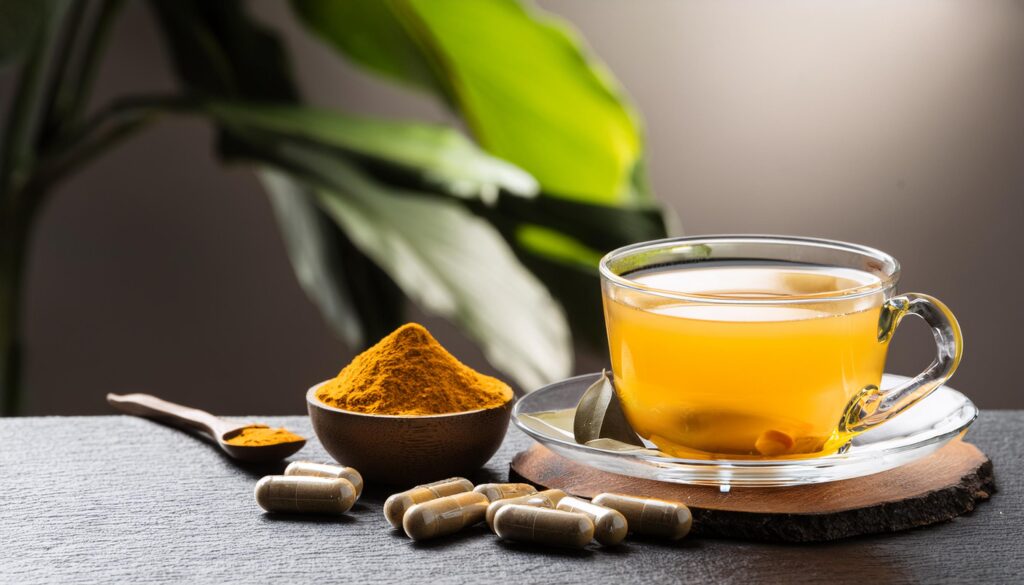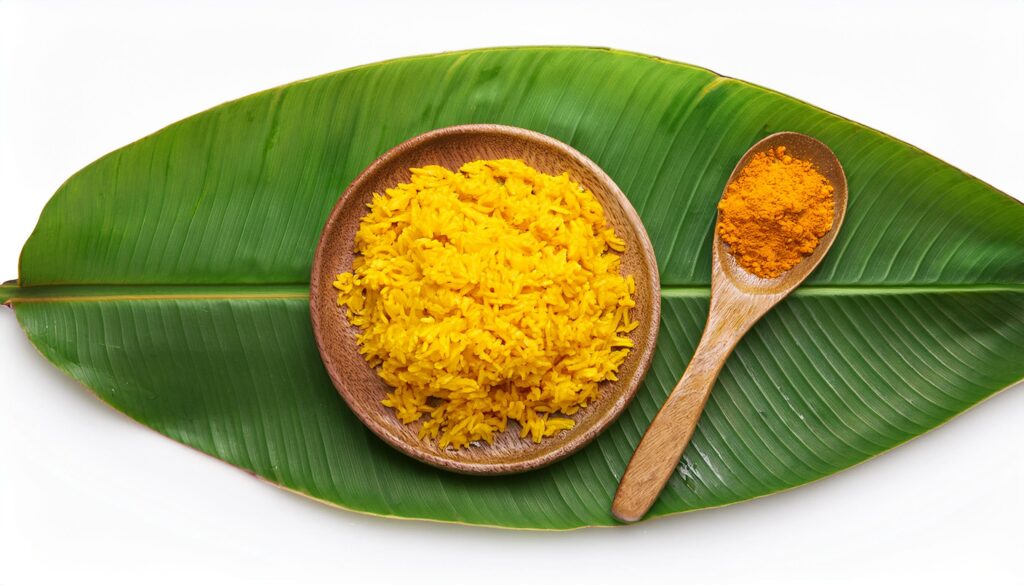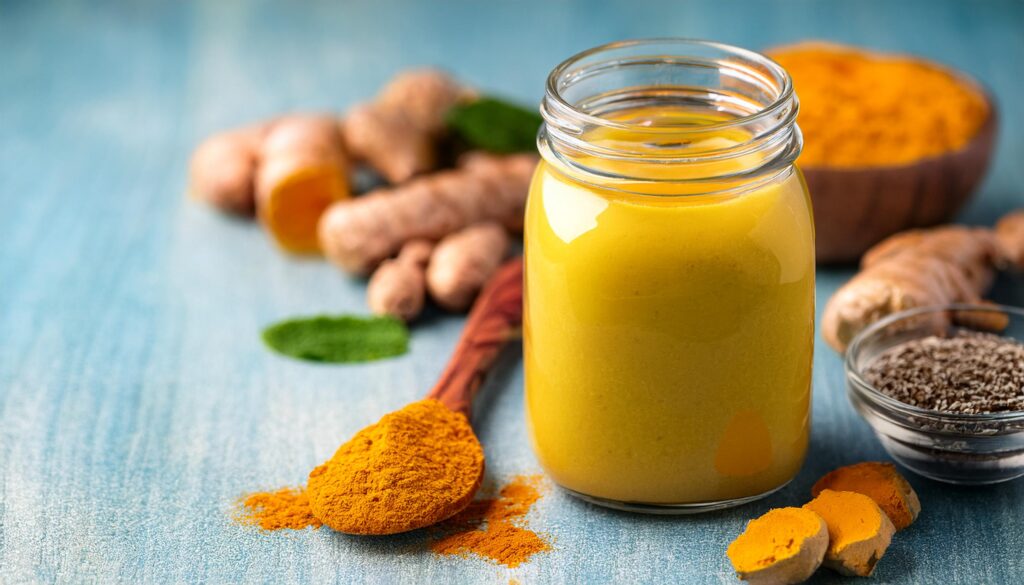Incorporating turmeric into your daily routine can significantly enhance your physical health due to its powerful anti-inflammatory, antioxidant, and antimicrobial properties. The active compound curcumin found in turmeric has been extensively studied and shown to reduce chronic inflammation. It is linked to various health issues such as arthritis, heart disease, and metabolic syndrome.
Curcumin’s antioxidant capabilities help it neutralize harmful free radicals. It protects the body from cellular damage and oxidative stress. Additionally, turmeric supports immune function, aids digestion, and promotes joint and skin health. By making turmeric a staple in your diet, you can harness these benefits, potentially preventing illnesses and maintaining overall well-being.
Physical Health Benefits of Turmeric
Turmeric, a golden-yellow spice derived from the Curcuma longa plant, has been celebrated for its numerous health benefits. The primary active compound in turmeric, curcumin, is renowned for its powerful anti-inflammatory and antioxidant properties. Here are some of the key health benefits associated with turmeric:
Anti-inflammatory
Turmeric helps reduce inflammation, making it beneficial for conditions like arthritis and other inflammatory diseases.

Antioxidant
Curcumin neutralizes free radicals, protecting the body from oxidative stress and cellular damage.
Immune Support
Turmeric boosts the immune system, enhancing the body’s defense against infections and diseases.
Joint Health
Regular consumption of turmeric can improve joint flexibility and reduce pain, particularly in cases of arthritis.
Digestive Aid

Turmeric promotes healthy digestion and can help alleviate symptoms of bloating and gas.
Brain Function
Curcumin may enhance brain function and lower the risk of brain diseases by increasing levels of brain-derived neurotrophic factor (BDNF).
Cancer Prevention

Some studies suggest that turmeric may play a role in preventing certain types of cancer.
Pain Relief
Its analgesic properties make turmeric effective in managing pain.
Liver Health
Turmeric supports liver function and detoxification processes.
Heart Health

It supports cardiovascular health by improving blood vessel function and reducing cholesterol levels.
Skin Health
It can improve skin health by reducing acne and eczema symptoms.
Antimicrobial
Turmeric has natural antimicrobial properties, which help fight infections.
Uses of Turmeric

Turmeric can be incorporated into daily routines in various forms:
Turmeric Powder
Used in cooking to add flavor and color to dishes.
Turmeric Tea
A soothing beverage that combines turmeric with water, honey, and lemon.
Turmeric Supplement
Available in capsules, tablets, or tinctures for those who prefer a concentrated dose.
Topical Applications
Turmeric paste can be applied to the skin to treat wounds and inflammatory conditions.
Golden Milk
A popular drink made with milk, turmeric, and other spices, often consumed before bedtime for its calming effects.
Delicious Turmeric Recipes
Here are some delicious and healthy recipes to help you incorporate turmeric into your diet:
Golden Milk

Ingredients: 1 cup milk (dairy or plant-based), 1 tsp turmeric powder, 1/2 tsp cinnamon, 1/4 tsp ginger powder, 1 tsp honey.
Instructions: Heat the milk and mix in the spices and honey. Stir well and enjoy warm.
Turmeric Smoothie
Ingredients: 1 banana, 1/2 cup pineapple, 1/2 tsp turmeric powder, 1 cup coconut water, 1 tsp chia seeds.
Instructions: Blend all ingredients until smooth and serve chilled.
Turmeric Rice

Ingredients: 1 cup basmati rice, 1 3/4 cups water, 1 tsp turmeric powder, 1/2 tsp cumin seeds, salt to taste.
Instructions: Rinse the rice, then cook it with water, turmeric, cumin, and salt. Fluff with a fork before serving.
Turmeric Roasted Vegetables
Ingredients: Mixed vegetables (carrots, potatoes, bell peppers), 2 tbsp olive oil, 1 tsp turmeric powder, salt and pepper to taste.
Instructions: Toss vegetables with olive oil, turmeric, salt, and pepper. Roast in the oven at 400°F for 25-30 minutes.
When incorporating turmeric into your daily routine, it’s essential to adhere to the recommended dosage and take certain precautions to ensure safety and effectiveness. Generally, for adults, a daily intake of 500-2,000 milligrams of turmeric, with 95% curcumin content, is considered safe and beneficial. However, turmeric’s absorption in the body can be enhanced by consuming it with black pepper, which contains piperine.
Sources of Turmeric
To reap the maximum health benefits, it’s essential to source high-quality turmeric. Here are some tips:
Fresh Turmeric Root
Available at health food stores and some grocery stores. Look for firm, unwrinkled roots.
Organic Turmeric Powder
Choose organic varieties to avoid pesticides and ensure higher curcumin content.
Supplements
Opt for reputable brands that provide third-party testing and contain black pepper extract (piperine) to enhance curcumin absorption.
Precautions in the Use of Turmeric
- Despite its benefits, turmeric should be used cautiously by individuals with gallbladder issues, as it can exacerbate symptoms.
- High doses of turmeric can cause gastrointestinal discomfort in some people.
- Pregnant and breastfeeding women should consult with healthcare providers before using turmeric supplements.
- Always choose high-quality turmeric products.
- Consult a healthcare professional before starting any new supplement regimen to tailor the dosage to your specific health needs.
Conclusion

Everyone in the family can enjoy the health benefits of turmeric through a variety of delicious recipes. Start the day with a refreshing turmeric smoothie, blending banana, pineapple, turmeric powder, coconut water, and chia seeds for a nutritious boost.
For lunch or dinner, try turmeric rice, which combines basmati rice with turmeric, cumin seeds, and a pinch of salt for a flavorful side dish. Roasted vegetables seasoned with olive oil, turmeric, salt, and pepper make for a tasty and healthy addition to any meal. Finally, unwind with a warm cup of golden milk before bed, made with milk (dairy or plant-based), turmeric, cinnamon, ginger, and honey.
These recipes not only provide a delightful culinary experience but also deliver the physical health benefits of turmeric, making it easy for the whole family to enjoy its advantages.
Disclaimer
The information provided in this write-up is for educational purposes only and is not intended as medical advice. While turmeric has been associated with various health benefits, individual results may vary, and it is important to consult with a healthcare professional before starting any new supplement or making significant changes to your diet. This is especially crucial for individuals with existing health conditions, those taking medications, pregnant or breastfeeding women, and anyone under the age of 18. Always seek the advice of your physician or other qualified health providers with any questions you may have regarding a medical condition.





